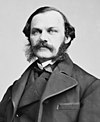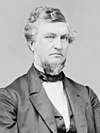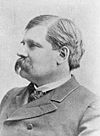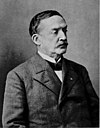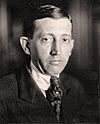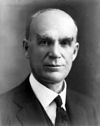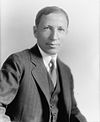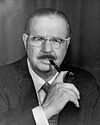
A | B | C | D | E | F | G | H | CH | I | J | K | L | M | N | O | P | Q | R | S | T | U | V | W | X | Y | Z | 0 | 1 | 2 | 3 | 4 | 5 | 6 | 7 | 8 | 9
 | |
 Headquarters (2024) | |
| Founded | June 1856; 168 years ago |
|---|---|
| Location |
|
Key people |
|
| Affiliations | Republican Party |
| Website | www |
The Republican National Committee (RNC) is the primary committee of the Republican Party of the United States. Its members are chosen by the state delegations at the national convention every four years.[3] It is responsible for developing and promoting the Republican brand and political platform, as well as assisting in fundraising and election strategy. It does not have direct authority over elected officials.[4] It is also responsible for organizing and running the Republican National Convention. When a Republican is president, the White House controls the committee. According to Boris Heersink, "political scientists have traditionally described the parties' national committees as inconsequential but impartial service providers."[5][6]
Similar committees exist in every U.S. state and most U.S. counties, although in some states party organization is structured by congressional district, allied campaign organizations being governed by a national committee. Michael Whatley is the current committee chairman.[7]
The Democratic Party's counterpart to the RNC is the Democratic National Committee.
History
The 1856 Republican National Convention appointed the first RNC. It consisted of one member from each state and territory to serve for four years. Each national committee since then has followed the precedent of equal representation for each state or territory, regardless of population. From 1924 to 1952, there was a national committeeman and national committeewoman from each state and U.S. possession, and from Washington, D.C. In 1952, committee membership was expanded to include the state party chairs of states that voted Republican in the preceding presidential election, have a Republican majority in their congressional delegation (U.S. representatives and senators), or have Republican governors. By 1968, membership reached 145. As of 2011, the RNC has 168 members.[8]
While a number of the chairs of the RNC have been state governors, the only person to have chaired the RNC and later become U.S. president is George H. W. Bush. During Bush's time as RNC chair, Spiro Agnew was being investigated for corruption, which would later lead to Agnew's resignation as vice president. Bush assisted, at the request of Nixon and Agnew, in getting John Glenn Beall Jr., the U.S. Senator from Maryland, to pressure his brother, George Beall the U.S. Attorney in Maryland, to shut down the investigation into Agnew. Attorney Beall ignored the pressure.[9]
In 2013, the RNC began an outreach campaign towards the American youth and minority voters, after studies showed these groups generally perceived that the Republican Party did not care about their concerns.[10]
During the presidency of Donald Trump, the RNC showed staunch loyalty to President Trump, even at times when prominent Republicans did not. Under Ronna McDaniel's leadership, the RNC ran ads for Trump's 2020 campaign as early as 2018, put numerous Trump campaign workers and affiliates on the RNC payroll, spent considerable funds at Trump-owned properties, covered his legal fees in the Russian interference investigation, hosted Trump's Fake News Awards, and criticized Trump critics within the Republican Party.[11] Two days after the January 6th riot at the Capitol following the controversial 2020 presidential election results, the RNC held an event where members expressed loyalty to the President.[12]
In February 2022, the RNC censured two Republican representatives, Liz Cheney of Wyoming and Adam Kinzinger of Illinois, for their participation in the United States House Select Committee to Investigate the January 6 Attack on the US Capitol; the censure statement described the committee as a "Democrat-led persecution of ordinary citizens who engaged in legitimate political discourse."[13] The censure of sitting congressmembers, and particularly the description of the January 6 events as "legitimate political discourse", received bipartisan criticism from politicians and media.[14][15]
In May 2024, The Associated Press reported that under Lara Trump, the RNC had "sought alliances with election deniers, conspiracy theorists and alt-right advocates the party had previously kept at arm's length."[16] It also noted the prevalence of election deniers had increased among top Republican officeholders and RNC officials as part of a larger election denial movement in the United States.[17]
Role
The Republican National Committee's main function is to assist the Republican Party of the United States. It helps to promote the Republican political platform and the "party brand" or image. It is more focused on campaign and organizational strategy than public policy.
It helps coordinate fundraising and election strategy, as well as organizing and running the Republican National Convention.
According to Jim Nicholson, a former chairman of the Republican National Committee:
“The party can’t coordinate with these Super PACs and neither can the campaigns so there’s a lot more chaos . . . .And the party structure clearly has a diminished role because they don’t have the resources they used to have.”[18]
Organization
This section needs expansion with: is the committee itself the entire organization or is their paid staff and volunteers, what is the internal structure and subcommittees if any, how is the election of committee members and its leadership and other officers structured, what are the relationships to state and county committees. You can help by adding to it. (January 2021) |
The current chair of the Republican National Committee is Michael Whatley, since March 8, 2024. Whatley was previously chair of the North Carolina Republican Party from 2019 to 2024.[19][20]
The previous chair of the Republican National Committee was Ronna McDaniel, serving from 2017 to 2024. McDaniel was chair of the Michigan Republican Party from 2015 to 2017.[21]
In January 2019, Thomas O. Hicks Jr. was elected co-chairman of the RNC. Hicks has a strong connection to former President Trump's campaigns and policy initiatives, having served as chairman of the America First Action PAC and America First Policies, and as national finance co-chairman for Donald J. Trump for President.[21]
Similar committees to the RNC exist in each U.S. state and most U.S. counties. The RNC also organizes volunteer groups for specific interests, such as the Black Republican Activists, GOP Hispanics, RNC Women (not to be confused with National Federation of Republican Women), GOP Faith, Asian Pacific Americans, Young Leaders and Veterans & Military Families.[21]
Other national leaders
- Treasurer: Kristin Crosbie, also on the RNC Executive Committee and Rules Committee
- Secretary: Vicki Drummond
- General Counsel: Michael Whatley
- Senate Republican Leader: Mitch McConnell
- Senate Republican Whip: John Thune
- Senate Republican Conference Chair: John Barrasso
- Senate Republican Policy Committee Chair: Joni Ernst
- Senate Republican Conference Vice Chairwoman: Shelley Moore Capito
- National Republican Senatorial Committee Chair: Steve Daines
- House Republican Conference Leader: Mike Johnson
- House Republican Floor Leader: Steve Scalise
- House Republican Whip: Tom Emmer
- House Republican Conference Chairwoman: Elise Stefanik
- House Republican Policy Committee Chairman: Gary Palmer


